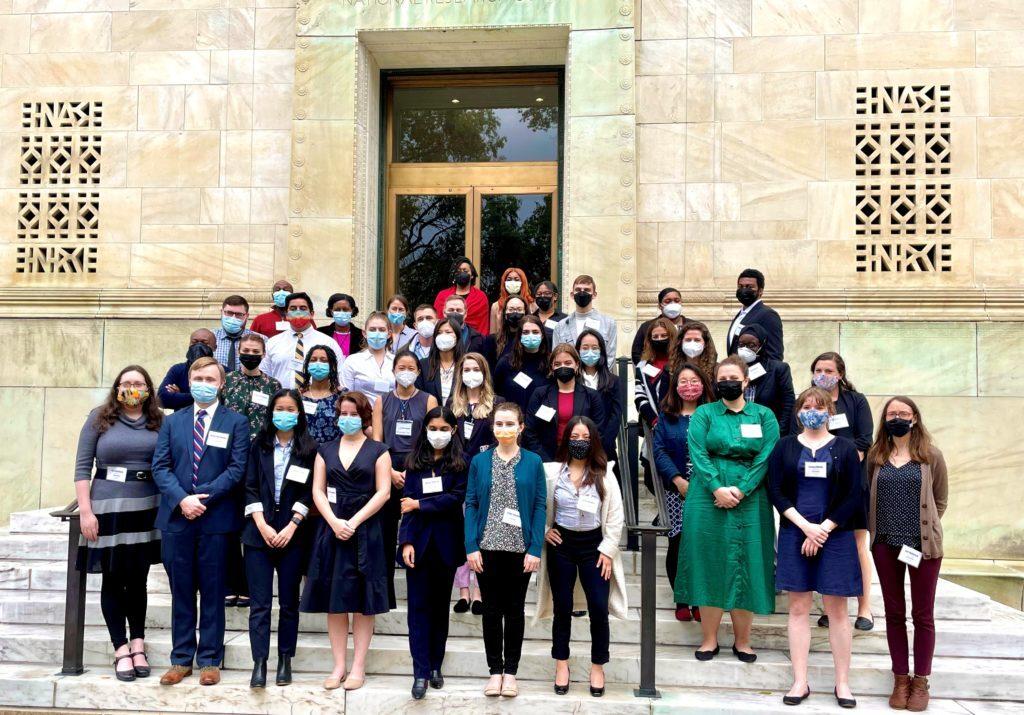Georgetown University students competed at the 2022 D.C. Public Health Case Challenge, an annual competition where teams from universities in the Washington, D.C. area create and present policy proposals aimed at solving a public health problem in the District.
Hosted by the National Academy of Medicine, this year’s competition, which took place Oct. 10, challenged teams to address youth intimate partner violence (IPV) in D.C. After receiving the case information, teams had two weeks to prepare a comprehensive five-year policy intervention plan with a hypothetical million-dollar budget.
The Georgetown team consisted of four students from the O’Neill Institute for National and Global Health Law At Georgetown Law — Alyaa Chace (LAW ’23), Bailey Smith (LAW ’23), Guillermina Pappier (LAW ’23) and Uttara Jhaveri (LAW ’23) — as well as Harrison Tandy (GRD ’23) and Carrigan Rice (NHS ’24).
According to the Centers for Disease Control and Prevention (CDC), 16 million women and 11 million men who reported experiencing sexual violence, physical violence or stalking by an intimate partner in their lifetime said they first experienced these forms of violence before they turned 18, a statistic Chace said is not widely discussed or known.
“I was surprised when I read the case because you normally don’t think about this issue from the perspective of youth,” Chace told The Hoya. “We can really make a tangible difference by focusing on education at an early age and increasing awareness to overcome the existing stigma around IPV.”
The Georgetown team created a solution titled “ICAN: IPV Counseling for Adolescents Now,” with the goal of helping at-risk high school students understand healthy relationships, according to Jhaveri. The proposal takes a two-part approach to intervention using peer-to-peer advisory and a youth theater drama program.
Jhaveri said the team chose peer counseling to mitigate the social stigma surrounding IPV through support groups led by mentors and facilitators who have experienced such violence firsthand.
“We wanted it to be a safe space like a support group that understands what you have gone through and can help you deal with the issue through their own personal experiences,” Jhaveri said. “Sometimes you just want someone who can talk and empathize with you.”
The team also proposed that the District collaborate with The Theater Lab, a school for dramatic arts in D.C., and use their youth programs to reach at-risk groups and spread awareness about IPV, according to Jhaveri.
“Drama programs have been conducted in many places to help spread awareness and understanding of what youth intimate partner violence is,” Jhaveri said. “The Theater Lab is a local NGO that promotes awareness through drama and shows and we thought this was a very unique and different way of reaching our target audience.”

Teams were judged based on four criteria: the interdisciplinary nature of their response, feasibility of implementation, creativity and practicality. The Georgetown team won the Wildcard Award for integrating the arts in their solution.
Chace said one of the team’s goals was to identify, research and consider all the groups affected by youth IPV across socioeconomic statuses, racial and ethnic backgrounds and more.
“For a policy to be effective, you must take into account diverse perspectives and interests,” Chace said. “Our fear is that we give a presentation that is not diverse and fails to address certain demographics or at-risk populations.”
Given that the members of the team came from varied backgrounds and schools at Georgetown, Jhaveri said the team collaborated across disciplines to create a comprehensive solution.
“Everyone chose a particular aspect of research they were most interested in,” Jhaveri told The Hoya. “For example, I wanted to focus on counseling for our solution and someone else wanted to find ways to use social media.”
Leading up to the competition, Chace said the team focused on testing the strength and feasibility of their policies.
“We are working every free minute to make sure we are asking questions and pressing on each other the same way we know the judges will,” Chace said before the event. “We are confident that we’ve created something that will make a real difference because we’ve looked at all the facets of the issue.”
Jhaveri said she enjoyed hearing and learning from other teams’ proposals, which included suggestions from youth leadership development to policy changes that support survivors.
“It was a great experience,” Jhaveri told The Hoya. “My biggest takeaway was learning how people from disciplines can come together and work to produce a creative solution. I loved hearing everyone’s thoughts and different approaches to the same problem.”





















